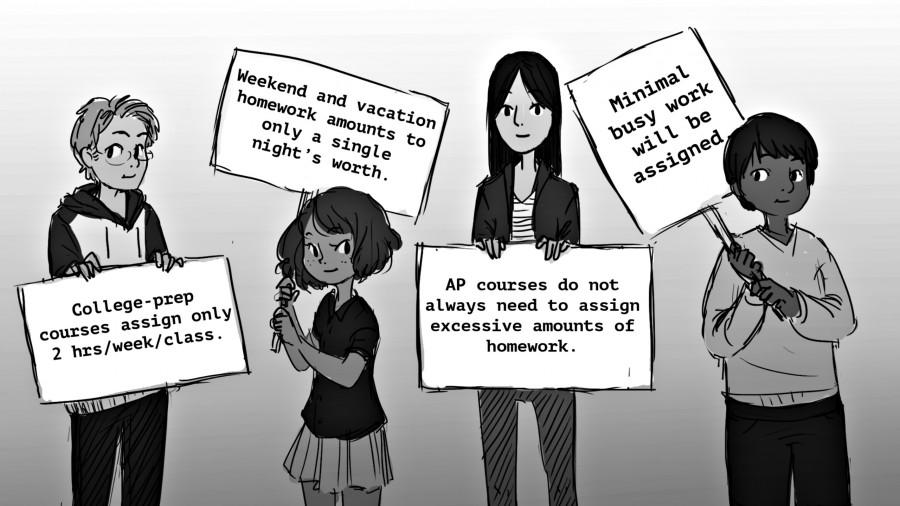Student Feedback Beneficial to Developing Homework Policy
Defining a homework policy can be a touchy subject, especially when most students will jump to the initial response of “we want no homework.” However, taking a more objective look at what a school’s homework policy should be is a good idea and hearing the voices of students who will be affected by it throughout the year is even better. By embracing student opinion and feedback, the district will find a more comprehensive policy that, while reasonable, will cater more to the needs of students and the business of their schedules.
On Monday, June 15, 2015, the school board revised its general policy which mandates that schools create and implement a homework policy. The board’s policy spoke very generally and was intended to allow the administrators of each school to create and modify their own respective homework policies. The proposition included guidelines for what types of homework should be assigned, when homework should be assigned and expectations for students, teachers and parents regarding the assigning and completion of homework.
The school’s leadership team, consisting of administrators, department coordinators, selected teachers and other staff members at the school, met on Thursday, October 29 to discuss what they thought would be an appropriate policy. Similarly, The Talon held a pizza lunch on Monday, November 9 to hear the views of students around campus and discuss and reach a consensus on what we thought the homework policy should include. The topics discussed included limits on homework in both college prep and AP/Honors courses, weekend homework, homework over breaks and holidays, school projects and work over summer.
As far as non-AP or Honors courses go, students generally thought that around two hours per week per course was a reasonable amount. This totals to about 30 minutes a night per course when you take into account block days. College prep courses shouldn’t take a significant amount of student’s homework time, and 30 minutes a night is a reasonable balance between too much and too little.
The situation gets slightly more complicated when considering AP courses because the amount of AP courses taken can vary significantly between students. One student might be completely swamped with six AP classes, while others may only have one, two or none. Generally speaking, students thought that AP classes should be allowed to have more homework than regular college prep classes, which is reasonable because they are at a higher level of academic rigor.
However, the key word here is “allowed.” Just because a class is labeled as AP doesn’t mean that it should always assign a huge amount of homework and homework assigned should still be reflective of what was done in class. Teachers should not be assigning busy work under the pretext that AP classes should keep students busy. Perhaps a solution could be reached in which homework is assigned based on how long the actual lessons are. This would result in a range of homework requiring from 45 minutes to an hour and a half, and would ensure homework remained a productive use of student time.
In terms of weekend homework, many students proposed to limit it to one normal weekday’s worth. Oftentimes weekend homework can block out an entire day, and teachers across departments tend to assign more homework on weekends than they do on weekdays. Weekends are there for a reason, and it’s not so that students can feel completely overwhelmed with work on one of their two days off. Also, some students have family responsibilities, jobs or other extracurricular activities that take up their weekend time.
While many students had many opinions on homework over breaks, the best solution would be to limit the homework overall. Holidays and breaks should allow students to relax and get a handle on their stressful academic lives. One solution could be only allowing one night’s worth of homework for the entire break, similar to the proposed weekend policy, or limiting work over breaks to long-term projects that are not due promptly when students return.
Projects, and specifically group projects, were also brought to the forefront of discussion. These projects can present problems to certain students due to their sometimes crazy and full schedules. Because of this, it was agreed unanimously across student discussions that teachers should be required to give students time in class to work on group oriented projects. Group projects should be a constructive, alternative way of learning in the classroom that do not further complicate student’s already busy lives.
Teachers should also have check-ins to make sure students stay on top of their project work and don’t fall behind, as to prevent some potentially stressful Sunday nights. As far as summer work for specific subjects goes, only rigorous AP or Honors courses should be allowed to assign it, like summer reading assignments from AP English classes.
A homework policy based on student feedback could considerably help to improve the stressful lives of students. Homework should be productive and make students feel like they are learning something, not signing their lives away to endless math problems and computer screens full of text. It will be interesting to see what the administration comes up with in regards to a specific homework policy in the near future.



